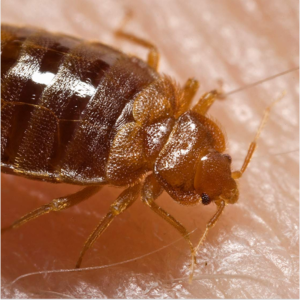17 year-old Sofia Radysh answers the key questions and concerns over the outbreak

Bed bug nymph (Cimex lectularius)
December 22, 2023
“Wrap your mattresses!” French residents take action against bedbug crisis
The bedbug outbreak took over France at the start of Autumn this year, and reports have shown a 65% increase in the spread of bed bugs in the capital. Residents have been taking matters and their mattresses into their own hands in response to the bedbug ‘crisis’ in the fashion capital of the world.
Young people living in France have shared the action they haven taken to try and stop the critters from dwelling in their homes.
Sasha, a 32-year-old marketing manager, commented on the issue advising to “wrap your mattresses!” The pesky critters are “causing trouble” she added.
Sasha has recently transferred to Paris for work, and consequently became very aware of the insects. Awareness about the bugs reached neighbouring countries too, and according to Rentokil, a pest control company, the UK has seen an increase in bed bugs by almost 70%.
The ‘crisis’ has been everywhere – across social media sites and national newspapers, highlighting the widespread panic. But what are these bugs and how is Paris trying to fight them off?
What are bed bugs? And why is there a resurgence now?
Bed bugs are the most popular species of ectoparasites, parasites that live on the skin of the host, in human’s life, according to an article in the MDPI.
They feed on every human, no matter gender or socioeconomic status. Bed bugs’ blood feeding can cause redness, itching and sometimes severe allergic reactions with an addition of considerable psychological distress. There is still no definite way of controlling these ectoparasites despite the efforts of public health authorities to manage them.
It is certainly not the first time these insects have infested Paris. In the 1950s, bed bugs were considered to be eradicated in France, but they have made a resurgence over the years. This has been attributed to the “the rise in travel and the increasing resistance of bed bugs to insecticides.” And it is thought to be accelerated by the banning of too harmful insecticides.
From 2017 to 2022 more than one in ten households has been infested by bed bugs, according to ANSES, the French Agency for Food, Environmental and Occupational Health Safety. Extermination reports say that they’ve treated more than 400,000 houses in 2018.
What is being done about the issue?
There are numerous responses and solutions to the problem across different levels. On a residential level, Parisians have been sharing tips on how to not bring the insects into their homes, such as using the dryer to dry clothes on a high temperature setting, wrap mattresses and even call in dogs that detect bed bugs.
On a larger scale, the city’s institutions are looking to resolve the issue to help people and tourists coming to the country, right before the 2024 Olympics, which is due to be held in Paris next summer.
The capital’s deputy Mayor Emmanuel Gregoire said in a letter to French Prime Minister Elisabeth Borne that the government needs to ‘urgently’ come up with a plan against ‘this scourge’ as the country is preparing for the Olympics in 2024.
Since the use of some of the chemicals that were used before for treating bed bugs are prohibited now by the EU, the pest control companies are using them less and less. People are also “less eager to have chemical products all over their house,” said Michael Berenger, an entomologist who co-founded the National Institute for the Study and Fight Against Bedbugs in 2018.
Bed bugs are becoming resistant to the chemicals, so when treated with them, they do not disappear but rather move to another location, to another apartment. Because of this the French government is now prioritising what is called ‘mechanical solutions’ – the use of cryogenic technologies, steam treatment and heat guns, which use either very high or low temperatures, to kill the insects and their eggs.
Are bed bugs a real issue?
While it might seem as if bed bugs have been causing major havoc, as the 2024 Olympics in Paris are approaching, a lot of media outlets have highlighted that the issue might be not as big as it seems.
With social media playing a big part, the story about the infestation has been blown out of proportion, especially with people travelling in and out of Paris during fashion week.
Learn more:
‘The way we expect to feel affects how we actually feel’.
Psychology Today, compares the recent bed bug episode in Paris to ‘The June Bug Incident’.
In the US in 1962, 62 workers in a clothing factory reported being bitten by tiny bugs. Exterminators to get rid of the insects and doctors to evaluate the employees were called but no evidence of bugs or anything else was found that could explain the symptoms.
The similarity of the situation in Paris is hard to miss, as a misperception of tiny insects surged through the media. The perception of the bugs comes from the ‘nocebo effect’ – a phenomenon when a person feels sick, because they expect to feel sick.
It has only been a couple of years since the COVID-19 pandemic, and therefore the global obsession with hygiene is still very much there. Although bed bugs are not attracted to dirt, there is still association drawn between the insects and gross, unhygienic places.
It makes sense for a first widespread incident of psychogenic illness to occur right after the pandemic and be perceived to be related to uncleanness, as hygiene is paid much more attention to these days.
Are bed bugs an international problem?
Bed bugs in the UK are at a reported 65% increase from 2022 to 2023, and France has seen the same 65% increase as well in pest-control visits for insects across the country according to France’s Union Chamber of Insect Control.
Although it might seem easy to connect the dots between France and the UK, The Guardian suggests that bed bugs were already on rise in the UK and there is no need to blame the French.
As the level of travel nears the pre-pandemic times, bedbugs are said to be travelling with us, which means that sightings are more frequent. The rise in charity-shopping and second hand furniture has also given more chances for bed bugs to spread easily.



